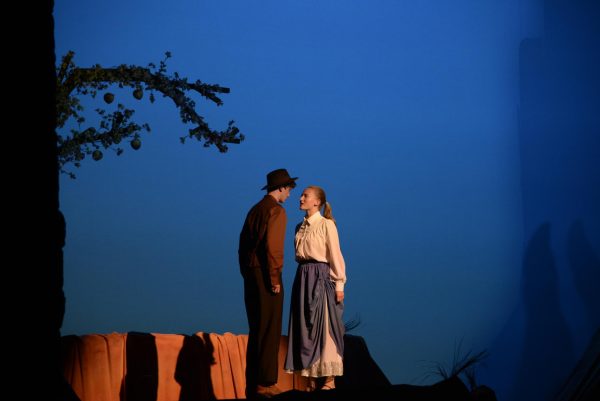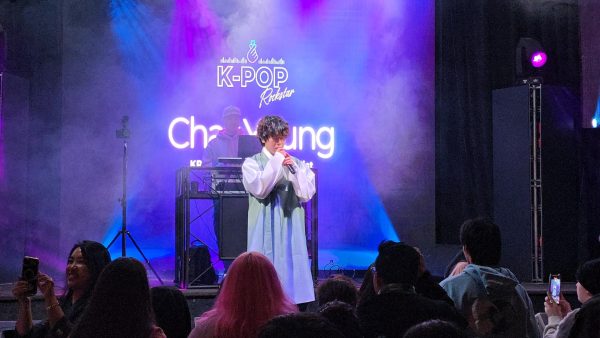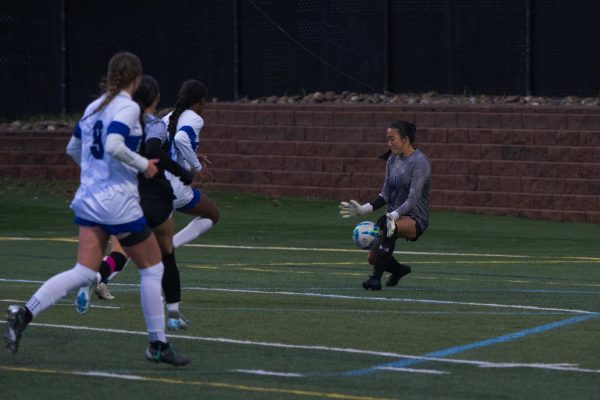In Defense of Don’t Worry Darling [OPINION]
On September 23rd, Olivia Wilde’s highly anticipated and star-studded sophomore film, Don’t Worry Darling, premiered in the U.S.
A thriller/horror that leads the audience through the story of Jack (Harry Styles) and Alice Chambers’ (Florence Pugh) beautiful life within a secluded and idealistic society, the Victory Project, that ultimately meets its impending doom.
Styles, Pugh, and Wilde are joined by an amazingly talented cast to deliver a stunning film that generously captures the essence of a thriller movie. I was shocked after my first watch to find the movie’s 38% Rotten Tomatoes score that suggests it failed to impact others in the audience the same way it impacted me.
The movie definitely did not get even a 90% Rotten Tomatoes score in my eyes because of reasons most of the media and I agree on. First, the development of the story and its rising action felt long, especially in contrast with the short, high energy ending. At times, scenes felt familiar or repetitive, while the ending seemed sudden and like the high speed train we were on all of the sudden jolted to a stop. These problems weren’t helped by the almost comical acting of some of the actors. As a Harry Styles fan, he exceeded my expectations in this movie, but my expectations were extremely low. There were definitely a couple of scenes that were meant to be emotional that were ruined by acting that felt like someone was trying to act. Yet, as Styles’ main character debut, and with Florence Pugh there to make up for what he lacked, I’m not as critical about it as some of the major critics who watched.
Nevertheless, anyone who watches the movie can agree that set and costume design are the strongest elements of the movie. Award-winning costume designer Arianne Phillips, transports the cast of Don’t Worry Darling into the 1950s through true vintage pieces and individually tailored ensembles made by her and her team. Each character was dressed in bold colors that compliment Matthew Libatique’s clean, symmetric cinematography. The two delivered the movie’s audience a playful, yet systematic aesthetic that Don’t Worry Darling’s story would be nothing without.
But that’s where my agreement with the media ends and critics join together to say the same things over again. Criticism of the movie’s lack of strong, central themes, a satisfying ending, and overall clarification that could have prevented some confusion are repeated in almost every credible review I read. Which led me to the conclusion that almost all of the negative media that came hurtling at Don’t Worry Darling is out of a place of confusion. Members of the press were critical of Wilde’s intersectionality between the movie’s thrilling purpose and an underdeveloped story of feminism. Which is just as confusing to me as it is enraging because although Wilde specifically geared parts of the movie to her female audience, its overall purpose was to tell a story that thrills its audience, not one that contributes to feminist propaganda.
A female protagonist’s only importance in a movie, also directed by a woman, is not to act as a feminist, and that’s not what Alice did in Don’t Worry Darling. Critics seem to be confusing the presence and importance of women in Don’t Worry Darling’s story and creation with it being an active part of the feminist message. Confusion around the movie’s central purpose is not helped by Don’t Worry Darling’s similarity to The Stepford Wives, another poorly rated movie with the same basic theme of a woman discovering the secrets of her seemingly great town. Wilde is criticized for having a shallow take on the familiar theme, but I am yet to see someone who isn’t shaken to their core by Don’t Worry Darling’s very original ending.
The only way I can rationalize the media’s confusion-turned-criticism is if they perceived the story as being told from a third person perspective. Or, at least, most of them wanted the story to be told that way because they’re asking for answers to questions that shouldn’t be answered. Wilde directed this movie as told from the perspective of Pugh’s Alice Chambers, so the audience is going through her story with her, thus only knowing what she knows. Don’t Worry Darling could’ve been a story where the audience watched the character traverse the film blindly, while we all know what they don’t, but Wilde and her team chose for the audience to be Alice Chambers.
We, as viewers, aren’t supposed to understand the inner workings of the Victory Project because Alice doesn’t. We aren’t supposed to discover the “importance” of symbols in the movie, like a red plane maybe, because Alice never does. And this is part of the reason why I love this movie and similarly told thrillers. It invites the audience to play an active role in the story. Don’t Worry Darling inspired deep conversations with the people around me because of the things left for us to decipher.
The spokespeople of the media waged an uncalled for attack on Don’t Worry Darling out of a place of confusion. Their vague and disputable criticism is almost frustrating. A second watch, or simple conversation with someone who understood what they didn’t, would have clarified their negative perspectives. If a beautifully shot, unpredictable psychological thriller isn’t for you, just say so, but allow the movie an appreciative platform of thriller-loving critics rather than the destructive and calloused audience it received because of its relevant cast.

What grade are you in?
I am in the 12th grade.
How many years have I been on Staff?
I have been on The Chronicle Staff for two years.
What...


![In Defense of Don't Worry Darling [OPINION]](https://ghschronicle.com/wp-content/uploads/2022/10/70E99D2F-7242-4946-A829-E93E22D5F77C-1200x559.jpeg)



![Dream Week Diaries: GHS Pep Assembly for Matthew [PHOTO GALLERY]](https://ghschronicle.com/wp-content/uploads/2025/03/VAN_8543-600x400.jpg)






